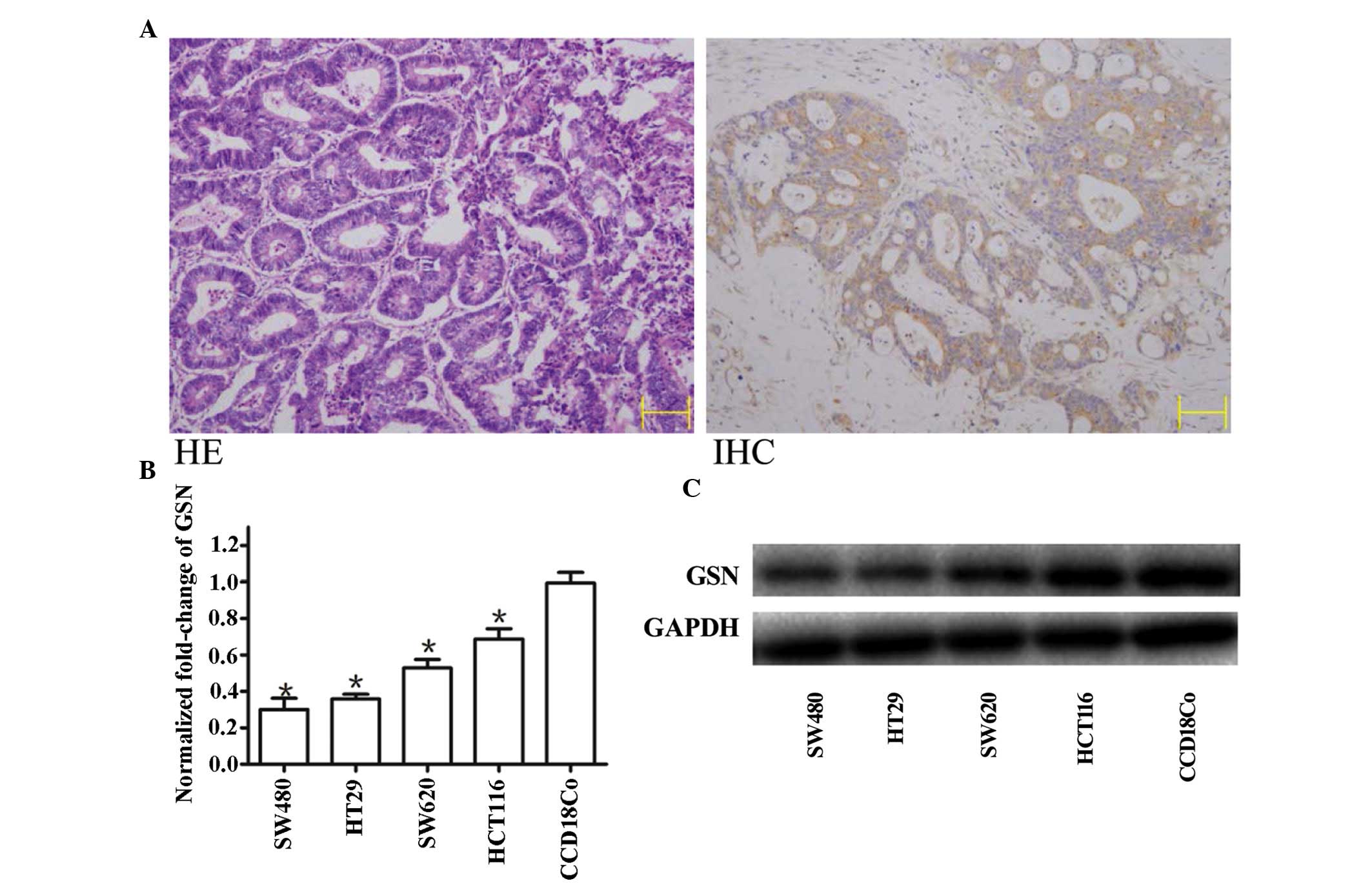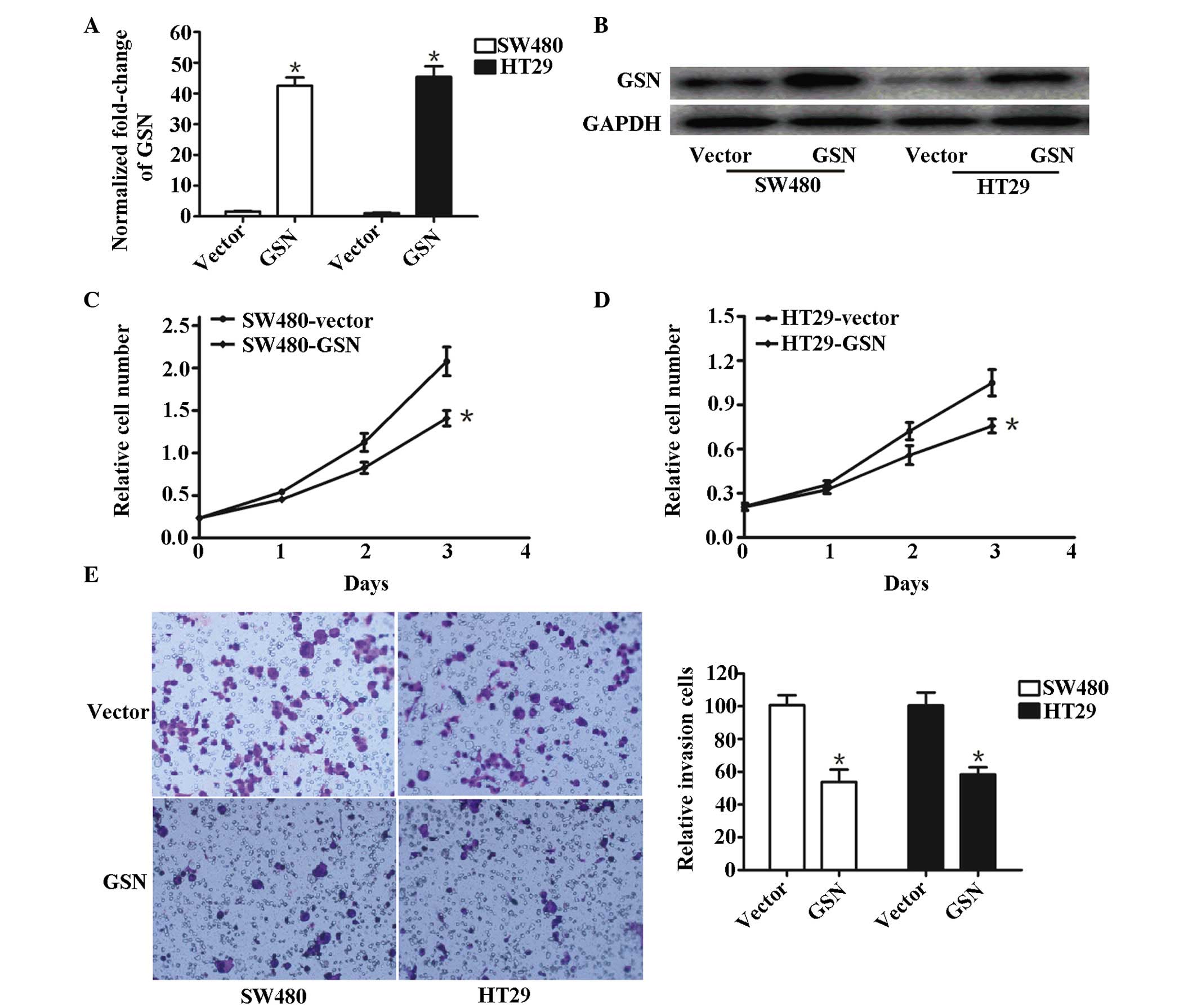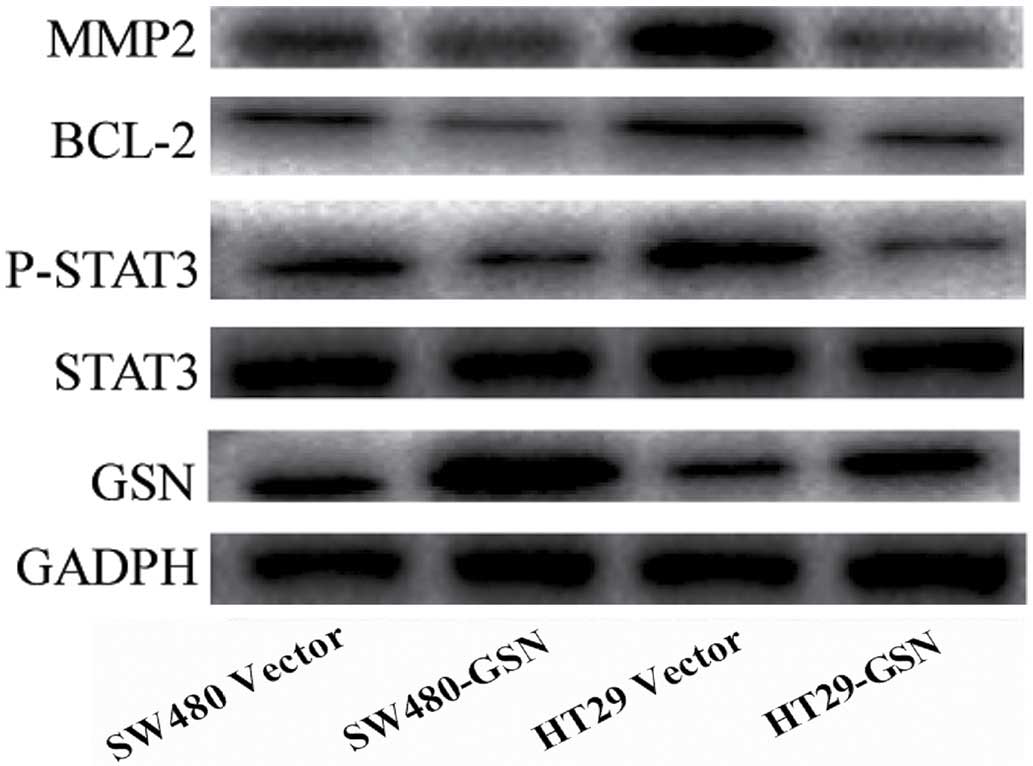|
1
|
Landherr L and Nagykálnai T: Chemotherapy
of elderly patients with colorectal cancer. Magy Onkol. 53:97–105.
2009.In Hungarian. View Article : Google Scholar : PubMed/NCBI
|
|
2
|
Meyerhardt JA and Mayer RJ: Systemic
therapy for colorectal cancer. N Engl J Med. 352:476–487. 2005.
View Article : Google Scholar : PubMed/NCBI
|
|
3
|
Jemal A, Murray T, Ward E, Samuels A,
Tiwari RC, Ghafoor A, Feuer EJ and Thun MJ: Cancer statistics,
2005. CA Cancer J Clin. 55:10–30. 2005. View Article : Google Scholar : PubMed/NCBI
|
|
4
|
Brenner H, Kloor M and Pox CP: Colorectal
cancer. Lancet. 383:1490–1502. 2014. View Article : Google Scholar
|
|
5
|
Ohman U: Prognosis in patients with
obstructing colorectal carcinoma. Am J Surg. 143:742–747. 1982.
View Article : Google Scholar : PubMed/NCBI
|
|
6
|
Moreaux J and Catala M: Carcinoma of the
colon: Long-term survival and prognosis after surgical treatment in
a series of 798 patients. World J Surg. 11:804–809. 1987.
View Article : Google Scholar : PubMed/NCBI
|
|
7
|
Slaby O, Svoboda M, Fabian P, Smerdova T,
Knoflickova D, Bednarikova M, Nenutil R and Vyzula R: Altered
expression of miR-21, miR-31, miR-143 and miR-145 is related to
clinicopathologic features of colorectal cancer. Oncology.
72:397–402. 2007. View Article : Google Scholar
|
|
8
|
Addeo R, Montella L, Baldi A, Cennamo G,
Guarrasi R, Faiola V, Caraglia M and Del Prete S: Atypical
cutaneous lymphoid hyperplasia induced by chemotherapy in a patient
with advanced colon carcinoma. Clin Colorectal Cancer. 6:728–730.
2007. View Article : Google Scholar : PubMed/NCBI
|
|
9
|
Dimitroff CJ, Sharma A and Bernacki RJ:
Cancer metastasis: A search for therapeutic inhibition. Cancer
Invest. 16:279–290. 1998. View Article : Google Scholar : PubMed/NCBI
|
|
10
|
Fidler IJ: Critical determinants of cancer
metastasis: Rationale for therapy. Cancer Chemother Pharmacol.
43(Suppl): S3–S10. 1999. View Article : Google Scholar : PubMed/NCBI
|
|
11
|
Yamaguchi H and Condeelis J: Regulation of
the actin cytoskeleton in cancer cell migration and invasion.
Biochim Biophys Acta. 1773:642–652. 2007. View Article : Google Scholar
|
|
12
|
Yin HL and Stossel TP: Control of
cytoplasmic actin gel-sol transformation by gelsolin, a
calcium-dependent regulatory protein. Nature. 281:583–586. 1979.
View Article : Google Scholar : PubMed/NCBI
|
|
13
|
Sun HQ, Yamamoto M, Mejillano M and Yin
HL: Gelsolin, a multifunctional actin regulatory protein. J Biol
Chem. 274:33179–33182. 1999. View Article : Google Scholar : PubMed/NCBI
|
|
14
|
Kwiatkowski DJ: Functions of gelsolin:
Motility, signaling, apoptosis, cancer. Curr Opin Cell Biol.
11:103–108. 1999. View Article : Google Scholar : PubMed/NCBI
|
|
15
|
Tanaka H, Shirkoohi R, Nakagawa K, Qiao H,
Fujita H, Okada F, Hamada J, Kuzumaki S, Takimoto M and Kuzumaki N:
siRNA gelsolin knockdown induces epithelial-mesenchymal transition
with a cadherin switch in human mammary epithelial cells. Int J
Cancer. 118:1680–1691. 2006. View Article : Google Scholar
|
|
16
|
Thor AD, Edgerton SM, Liu S, Moore DH 2nd
and Kwiatkowski DJ: Gelsolin as a negative prognostic factor and
effector of motility in erbB-2-positive epidermal growth factor
receptor-positive breast cancers. Clin Cancer Res. 7:2415–2424.
2001.PubMed/NCBI
|
|
17
|
Rao J, Seligson D, Visapaa H, Horvath S,
Eeva M, Michel K, Pantuck A, Belldegrun A and Palotie A: Tissue
microarray analysis of cytoskeletal actin-associated biomarkers
gelsolin and E-cadherin in urothelial carcinoma. Cancer.
95:1247–1257. 2002. View Article : Google Scholar : PubMed/NCBI
|
|
18
|
Dosaka-Akita H, Hommura F, Fujita H,
Kinoshita I, Nishi M, Morikawa T, Katoh H, Kawakami Y and Kuzumaki
N: Frequent loss of gelsolin expression in non-small cell lung
cancers of heavy smokers. Cancer Res. 58:322–327. 1998.PubMed/NCBI
|
|
19
|
Chen P, Murphy-Ullrich JE and Wells A: A
role for gelsolin in actuating epidermal growth factor
receptor-mediated cell motility. J Cell Biol. 134:689–698. 1996.
View Article : Google Scholar : PubMed/NCBI
|
|
20
|
Lader AS, Lee JJ, Cicchetti G and
Kwiatkowski DJ: Mechanisms of gelsolin-dependent and -independent
EGF-stimulated cell motility in a human lung epithelial cell line.
Exp Cell Res. 307:153–163. 2005. View Article : Google Scholar : PubMed/NCBI
|
|
21
|
Fujita H, Okada F, Hamada J, Hosokawa M,
Moriuchi T, Koya RC and Kuzumaki N: Gelsolin functions as a
metastasis suppressor in B16-BL6 mouse melanoma cells and
requirement of the carboxyl-terminus for its effect. Int J Cancer.
93:773–780. 2001. View
Article : Google Scholar : PubMed/NCBI
|
|
22
|
Gao SP and Bromberg JF: Touched and moved
by STAT3. Sci STKE. 2006:pe302006.PubMed/NCBI
|
|
23
|
Costantino L and Barlocco D: STAT 3 as a
target for cancer drug discovery. Curr Med Chem. 15:834–843. 2008.
View Article : Google Scholar : PubMed/NCBI
|
|
24
|
Aggarwal BB, Kunnumakkara AB, Harikumar
KB, Gupta SR, Tharakan ST, Koca C, Dey S and Sung B: Signal
transducer and activator of transcription-3, inflammation, and
cancer: How intimate is the relationship? Ann N Y Acad Sci.
1171:59–76. 2009. View Article : Google Scholar : PubMed/NCBI
|
|
25
|
Aggarwal BB, Sethi G, Ahn KS, Sandur SK,
Pandey MK, Kunnumakkara AB, Sung B and Ichikawa H: Targeting
signal-transducer-and-activator-of-transcription-3 for prevention
and therapy of cancer: Modern target but ancient solution. Ann N Y
Acad Sci. 1091:151–169. 2006. View Article : Google Scholar
|
|
26
|
Berry DC, Levi L and Noy N:
Holo-retinol-binding protein and its receptor STRA6 drive oncogenic
transformation. Cancer Res. 74:6341–6351. 2014. View Article : Google Scholar : PubMed/NCBI
|
|
27
|
Ung N, Putoczki TL, Stylli SS, Ng I,
Mariadason JM, Chan TA, Zhu HJ and Luwor RB: Anti-EGFR therapeutic
efficacy correlates directly with inhibition of STAT3 activity.
Cancer Biol Ther. 15:623–632. 2014. View Article : Google Scholar : PubMed/NCBI
|
|
28
|
Shen A, Chen Y, Hong F, Lin J, Wei L, Hong
Z, Sferra TJ and Peng J: Pien Tze Huang suppresses IL-6-inducible
STAT3 activation in human colon carcinoma cells through induction
of SOCS3. Oncol Rep. 28:2125–2130. 2012.PubMed/NCBI
|
|
29
|
Geinguenaud F, Souissi I, Fagard R, Motte
L and Lalatonne Y: Electrostatic assembly of a DNA
superparamagnetic nano-tool for simultaneous intracellular delivery
and in situ monitoring. Nanomedicine (Lond). 8:1106–1115. 2012.
|
|
30
|
Lerner I, Hermano E, Zcharia E, Rodkin D,
Bulvik R, Doviner V, Rubinstein AM, Ishai-Michaeli R, Atzmon R,
Sherman Y, et al: Heparanase powers a chronic inflammatory circuit
that promotes colitis-associated tumorigenesis in mice. J Clin
Invest. 121:1709–1721. 2011. View
Article : Google Scholar : PubMed/NCBI
|
|
31
|
Zugowski C, Lieder F, Müller A, Gasch J,
Corvinus FM, Moriggl R and Friedrich K: STAT3 controls matrix
metalloproteinase-1 expression in colon carcinoma cells by both
direct and AP-1-mediated interaction with the MMP-1 promoter. Biol
Chem. 392:449–459. 2011. View Article : Google Scholar : PubMed/NCBI
|
|
32
|
Tsareva SA, Wagner S, Müller A, Corvinus F
and Friedrich K: Cell-cell contacts induce STAT3 activity in colon
carcinoma cells through an autocrine stimulation loop. J Cancer Res
Clin Oncol. 137:857–863. 2011. View Article : Google Scholar
|
|
33
|
Fenton JI and Birmingham JM: Adipokine
regulation of colon cancer: Adiponectin attenuates
interleukin-6-induced colon carcinoma cell proliferation via
STAT-3. Mol Carcinog. 49:700–709. 2010.PubMed/NCBI
|
|
34
|
Tadlaoui Hbibi A, Laguillier C, Souissi I,
Lesage D, Le Coquil S, Cao A, Metelev V, Baran-Marszak F and Fagard
R: Efficient killing of SW480 colon carcinoma cells by a signal
transducer and activator of transcription (STAT) 3 hairpin decoy
oligodeoxynucleotide–interference with
interferon-gamma-STAT1-mediated killing. FEBS J. 276:2505–2515.
2009. View Article : Google Scholar : PubMed/NCBI
|
|
35
|
O'Connell JB, Maggard MA and Ko CY: Colon
cancer survival rates with the new American Joint Committee on
Cancer sixth edition staging. J Natl Cancer Inst. 96:1420–1425.
2004. View Article : Google Scholar : PubMed/NCBI
|
|
36
|
Livak KJ and Schmittgen TD: Analysis of
relative gene expression data using real-time quantitative PCR and
the 2(-Delta Delta C(T)) Method. Methods. 25:402–408. 2001.
View Article : Google Scholar
|
|
37
|
Marín O and Rubenstein JL: Cell migration
in the forebrain:. Annu Rev Neurosci. 26:441–483. 2003. View Article : Google Scholar
|
|
38
|
Martin TA, Ye L, Sanders AJ, Lane J and
Jiang WG: Cancer Invasion and Metastasis: Molecular and Cellular
Perspective. Madame Curie Bioscience Database [Internet] Landes
Bioscience. 2000, Austin: Available from: http://www.ncbi.nlm.nih.gov/books/NBK164700/.
|
|
39
|
Linder S: The matrix corroded: Podosomes
and invadopodia in extracellular matrix degradation. Trends Cell
Biol. 17:107–117. 2007. View Article : Google Scholar : PubMed/NCBI
|
|
40
|
Wen D, Corina K, Chow EP, Miller S, Janmey
PA and Pepinsky RB: The plasma and cytoplasmic forms of human
gelsolin differ in disulfide structure. Biochemistry. 35:9700–9709.
1996. View Article : Google Scholar : PubMed/NCBI
|
|
41
|
Koya RC, Fujita H, Shimizu S, Ohtsu M,
Takimoto M, Tsujimoto Y and Kuzumaki N: Gelsolin inhibits apoptosis
by blocking mitochondrial membrane potential loss and cytochrome c
release. J Biol Chem. 275:15343–15349. 2000. View Article : Google Scholar : PubMed/NCBI
|
|
42
|
Tanaka M, Müllauer L, Ogiso Y, Fujita H,
Moriya S, Furuuchi K, Harabayashi T, Shinohara N, Koyanagi T and
Kuzumaki N: Gelsolin: A candidate for suppressor of human bladder
cancer. Cancer Res. 55:3228–3232. 1995.PubMed/NCBI
|
|
43
|
Buettner R, Mora LB and Jove R: Activated
STAT signaling in human tumors provides novel molecular targets for
therapeutic intervention. Clin Cancer Res. 8:945–954.
2002.PubMed/NCBI
|
|
44
|
Cross-Knorr S, Lu S, Perez K, Guevara S,
Brilliant K, Pisano C, Quesenberry PJ, Resnick MB and Chatterjee D:
RKIP phosphorylation and STAT3 activation is inhibited by
oxaliplatin and camptothecin and are associated with poor prognosis
in stage II colon cancer patients. BMC Cancer. 13:4632013.
View Article : Google Scholar : PubMed/NCBI
|


















